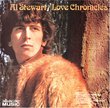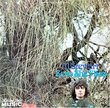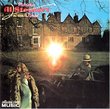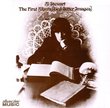| All Artists: Al Stewart Title: Orange Members Wishing: 1 Total Copies: 0 Label: Bgo (Beat Goes on) (UK) Release Date: 1/29/1993 Album Type: Import Genres: Folk, International Music, Pop, Rock, Classic Rock Styles: Europe, Britain & Ireland, Singer-Songwriters, Soft Rock, Folk Rock, Progressive, Progressive Rock, Album-Oriented Rock (AOR) Number of Discs: 1 SwapaCD Credits: 1 |
Search - Al Stewart :: Orange
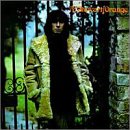 | Al Stewart Orange Genres: Folk, International Music, Pop, Rock, Classic Rock
CD debut/reissue of his 1972 studio album, first released on Columbia. 8 tracks: 'You Don't Even Know Me','Amsterdam', 'Songs Out Of Clay', 'The News From Spain','I Don't Believe You', 'Once An Orange, Always An Orange','I... more » |
Larger Image |
CD DetailsSynopsis
Album Description CD debut/reissue of his 1972 studio album, first released on Columbia. 8 tracks: 'You Don't Even Know Me','Amsterdam', 'Songs Out Of Clay', 'The News From Spain','I Don't Believe You', 'Once An Orange, Always An Orange','I'm Falling' and 'Night Of The 4th Of May'.*Pre-'Year Of The Cat', 'On The Border', 'Song On The Radio'& 'Time Passages' album by the man. Similar CDs
|
CD ReviewsEarly Musings Kurt Harding | Boerne TX | 08/03/2004 (4 out of 5 stars) "My love affair with the music of Al Stewart began with the issue of Past, Present and Future. Then, I was fresh out of high school with every cent needed for living expenses. Money to go and buy earlier albums of artists I had come to like was scarce. Now, after years of listening to Stewart, buying all of his post PPF albums, and hearing him a number of times live, I have become curious about his earliest recordings. So I took the plunge and picked up Orange. My first impression was that it is pretty mediocre when compared with some of Stewart's future offerings. But then I forced myself to think in terms of the times in which this first appeared and compare it with other music coming out at the same time. When I looked at it that way, it rose in my estimation. Three songs in particular stand out here: Songs Out of Clay, The News From Spain, and the instrumental Once An Orange, Always An Orange. Songs Out Of Clay presages the development of Stewart as a modern troubador and as a wordsmith and storyteller without parallel. News From Spain is a great early example of a Stewart love song sited in an exotic locale. The rare Stewart instrumental features a silly name, but some tasty chops. I also like Al's rendition of Bob Dylan's I Don't Believe You and his own composition The Night Of The 4th Of May, another love song written in his inimitable way. Among the standout musicians featured are Tim Renwick, who is to work with Stewart for many years, keyboardist Rick Wakeman, and 60s legend Brinsley Schwarz. Though this CD may never have mass appeal, it is recommended to any Al Stewart fans who missed it. Now that I've heard how good some of his early musings are, I will seek out his first three albums." Orange: Bittersweet Chronicles of free love's detritus...or Peter Walenta | Long Island, New York USA | 05/30/2008 (4 out of 5 stars) "Al Stewart is quoted in the liner notes to the CD re-issue of "Orange", that he suffered writer's block for nearly two years after the release of his third album "Zero She Flies" in 1970 and that it was only the ensuing breakup with his longtime girlfriend, Mandy Newell that got his creative juices flowing again. The 10 songs on "Orange", originally released on January 1, 1972 in the UK and in Europe only, are the interesting fruits of his toils. Another reviewer here erroneously as has been pointed out, claims to have heard "Carol" and "Sirens of Titan", but after repeated listenings to "Orange", I hear snippets of melody that Stewart would more successfully incorporate into his 1974 masterpiece, "Past, Present and Future", as for instance the rhythmic acoustic guitar chord that leads into "Songs Out of Clay" which can later be heard more fully fleshed out on 1974's, "Roads to Moscow". With producer John Anthony at the helm for "Orange" great care was put into engineering these songs, as Stewart's vocals are clearer, the string arrangements are lush but not overbearing, and the guitars, bass and drums blend in a much cleaner sounding mix than previous Stewart albums. And what of the songs? Al Stewart was still searching for a unique unifying theme and alas he did not quite find it on "Orange" which is a collection of nice but fairly straightforward lost love tunes in the singer songwriter confessional style that was so much in vogue in the early `70's (Joni Mitchell, Elton John). Stewart, with his new band in tow including Tim Renwick and Brinsley Schwarz on guitars and Rick Wakemen on keyboards, appropriately recorded an upbeat cover of Bob Dylan's kiss off love lost tune, "I Don't Believe You" to jump-start the "Orange" studio sessions. Although Stewart conveys a genuine hurt over his breakup with Mandy, he wisely avoids wallowing in self pity by keeping the melodies light and bouncy and by focusing his lyrics on documenting the sometimes touching, occasionally sad, and other times funny events of the doomed relationship. With his keen eye for factual detail, Stewart in a journalistic style, depicts the joys and travails of young Brits in love in the post-1967 hippie era, where a certain innocence is revealed in going to a Hendrix concert, traveling to Holland, staying in and making love, getting into a fight at a party and even in infidelity (it wasn't called `swinging' London for nothing). Stewart, who is quoted in the liner notes again said that these songs were `cathartic'. Only on "Songs Out of Clay and "Night of the 4th of May" does Stewart explore some darker moods and imagery that must have been present during the stormy parts of the breakup. Stewart's moral is that free love has personal and emotional consequences, and while not an entirely novel idea, it is a reasonably accurate assessment of romantic relationships that go sour in any "era". Stewart acknowledges all of these events of his past love relationship and then moves on, clearing the deck so he could fully tap into his creative muse two years later for "Past, Present and Future". Available only as a UK import, it's nice to see "Orange" finally available on CD in the US. The bonus tracks, since they are NOT out takes from the "Orange" sessions, are rather superfluous with the only interesting song being Stewart's sprightly cover of Paul Anka's, "It Doesn't Matter Anymore". "Orange" is highly recommended for Al Stewart fans, as it shows the artist in transition from lovelorn folk singer to progressive folk rocker. "Orange is also recommended to any fans of the 70's singer songwriter style of light rock. 4 Stars" Finally I have Al Stewart's classic album "Orange" as a CD Michael J. Heckenberger | 02/10/2008 (5 out of 5 stars) "Orange was always a personal favorite of mine. I remember hearing it for the first time at a party while in college in the 70s. While not nearly as well known as "Past, Present and Future," "Year of the Cat" or "Time Passages," "Orange" has some fabulous tracks. "Songs Out of Clay," "Amsterdam" and "You Don't Even Know Me" could be heard well into the 80s at eateries such as Bennigan's ot TGIF so obviously other people had taken notice of this album. Unfortunately Al Stewart never achieved the fame that I thought he deserved but his music has aged very well. I highly recommend this CD if you like Al Stewart at all in the 70s."
|

 Track Listings (8) - Disc #1
Track Listings (8) - Disc #1